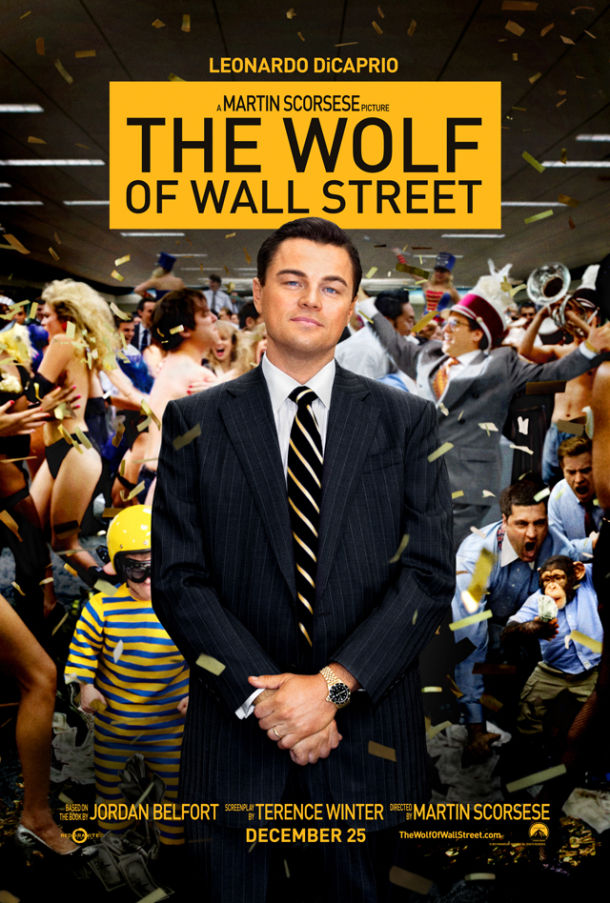This is a guest post by Heather Brown.
If you’re thinking about going to see The Wolf of Wall Street, you might just consider staying home and watching Goodfellas, which you’re sure to catch on TV (because it’s never not on TV). Or get The Departed on Netflix. Or Raging Bull. Or Taxi Driver. Even better, Alice Doesn’t Live Here Anymore. There are numerous other fixes to sate a Scorsese appetite without forking over your holiday cash to this three and a half hour slog through wealth, uppers, downers, hookers, orgies, scumbags, and more scumbags. Let me first say that I went into the film expecting to be disgusted. About all I knew was that the story was based on the memoir The Wolf of Wall Street, written by Jordan Belfort, a former stockbroker convicted of securities fraud and money laundering. Throughout most of the 1990s, Belfort ripped off stock buyers to the tune of $110.4 million dollars. He trafficked in penny stocks, and founded a brokerage house called Stratton Oakmont, and as a result of his scams many people suffered—and continue suffering. So if I knew all that, why did I even bother? Shame on me, right? Well, I try to keep an open mind when it comes to Scorsese. He’s a brilliant director capable of surprising his audience and expanding our sense of what a cinematic experience can be. He’s so good that I can even forgive him for making films that consistently fail the Bechdel test. The Wolf of Wall Street, though, is not Scorsese at his best. It might even be at his worst. And that’s because we all know how great he can be.
Let’s set aside that there are many, many, more beautiful naked women than men in this film, and that they are often acting out porn fantasies for the delight of devastatingly unattractive males (sorry Jonah Hill and Henry Zebrowski!). There’s also much casual misogyny expressed in small talk about women’s shaving habits and a lengthy explanation of the three types of hookers, “classified like publically traded stocks,” which Scorsese couldn’t seem to help but dramatize in particularly cringe-worthy scenes. Worse than all that, though, are the thinly drawn relationships between Jordan (Leonardo DiCaprio) and the women in his life. First, there’s his first wife Teresa, played by Cristin Milioti. When we first meet the couple, Jordan is nowhere near as addicted to drugs, sex, and money as he’ll soon become, and we see them both as young upstarts trying to make their way. Once Jordan gets his penny stock racket under way, so follows the debauchery. Surely, we think, Teresa must know at least some of what the audience knows: that Jordan’s “working late” is not motivated by the pure drive to provide superior service to his customers. Surely there are more than a few popular culture instances of wives being fully aware of the compromises they’re making with their high-powered husbands (Mellie Grant, anyone?). If Teresa knows the score, Scorsese never tells us. It’s not until Naomi, played by Margot Robbie, enters the picture that Teresa finds out Jordan is a dog. Then she disappears from his life and the narrative.
If there was a ever a woman who should know the deal she’s making with a man like Jordan it’s Naomi. She’s every bit as materialistic and entranced by wealth as her husband, yet Scorsese give us nothing like the fire or toughness that Sharon Stone’s Ginger had in Casino or that Lorraine Bracco’s Karen had in Goodfellas. And it’s not Robbie’s fault—she’s tremendous and does the best she could with the role—it’s Scorsese’s for missing the opportunity to go beyond the trope of the trophy wife to a create a character with just a touch a more depth.
The real kicker for me comes in the film’s final act. During the Jordan’s last speech to his staff—and there are more than a few speeches—he turns his attention to a woman named Kimmie, a character we have never met before this scene. He tells the staff Kimmie’s story: she came to him as a desperate single mother in need of a job and a $5,000 cash advance to pay her son’s tuition. She tells everyone that Jordan gave her $25,000, changed her life, made her rich, and tearfully says, “I fucking love you, Jordan!” Is this just another moment of dark comedy, or are we supposed to be manipulated into believing our main character has a generous soul, especially when it comes to women?
I will say there are two good things about this film: 1) Sharon Jones and the Dap-Kings are on the soundtrack and make a cameo at Jordan and Naomi’s wedding, and 2) Fran Lebowitz makes an appearance to set Jordan’s $10 million bail. But make no mistake: that’s not a reason to see this film. Just stay home and watch Scorsese’s documentary about her, Public Speaking, a couple of times. That’s just enough to cleanse the palette.
Heather Brown lives in Chicago, Ill., and works as a freelance instructional designer and online writing instructor. She lives for feminism, movies, live music, road trips, and cheese.



